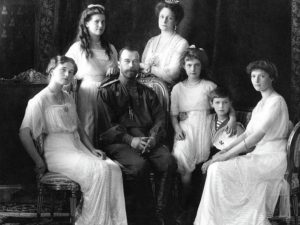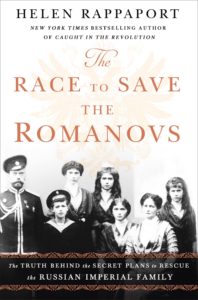by Helen Rappaport
For the Romanov family at the Ipatiev House, Tuesday, 16 July, in Ekaterinburg was much like any other day, punctuated by the same frugal meals, brief periods of recreation in the garden, reading, and games of cards. Over the last three months, their lives had become deadened by the extreme constraints placed upon them and by a total lack of contact with the outside world. It was only the fact that they were still together, and in Russia, that kept them going; that and their profound religious faith and absolute trust in God.
Since being brought here they had come to cherish the smallest and simplest of pleasures: the sun had shone; Alexey was recovering from his recent bout of illness and the nuns had been allowed to bring him eggs; they had been granted the luxury of an occasional bath. Such are the few passing, mundane details from the Tsaritsa’s diary that have come down to us of the family in their final days and hours. Yet, despite their brevity, they give us a clear and unshakeable image of the family’s state of calm—almost pious acceptance—at this time.
 We have no way of seeing into the true workings of their hearts and minds, of course, but we do know from everything their guards later said that Alexandra, in particular, had by now resolutely given herself up to God. She was in almost constant pain—her heart, her back, her legs, everything ached—and her faith was her only refuge. She seemed content to retreat into a state of religious meditation, spending most of her time being read to from her favorite spiritual works, usually by Tatiana. One of the girls always sat with her, giving up her precious recreation time when the others were allowed out into the garden. But, as always, none of the four sisters ever complained. They accepted their situation with incredible forbearance. Nicholas, too, struggled on as best he could, buoyed up by his faith and the loving support of his daughters, although Olga—perhaps, of all the family, consumed by a private sense of despair—had become very thin and morose and was more withdrawn than ever. Her brother and sisters, however, all longed for something to relieve their crippling boredom. In the absence of access to the outside world, their only diversions were snatches of conversation with the more sympathetic of their guards, but even these had been severely curtailed by the new commandant, Yakov Yurovsky, at the beginning of July.
We have no way of seeing into the true workings of their hearts and minds, of course, but we do know from everything their guards later said that Alexandra, in particular, had by now resolutely given herself up to God. She was in almost constant pain—her heart, her back, her legs, everything ached—and her faith was her only refuge. She seemed content to retreat into a state of religious meditation, spending most of her time being read to from her favorite spiritual works, usually by Tatiana. One of the girls always sat with her, giving up her precious recreation time when the others were allowed out into the garden. But, as always, none of the four sisters ever complained. They accepted their situation with incredible forbearance. Nicholas, too, struggled on as best he could, buoyed up by his faith and the loving support of his daughters, although Olga—perhaps, of all the family, consumed by a private sense of despair—had become very thin and morose and was more withdrawn than ever. Her brother and sisters, however, all longed for something to relieve their crippling boredom. In the absence of access to the outside world, their only diversions were snatches of conversation with the more sympathetic of their guards, but even these had been severely curtailed by the new commandant, Yakov Yurovsky, at the beginning of July.
By the evening of the 16th we do not even have Nicholas’s few restrained daily comments to go on, for on Sunday, the 13th, he had finally given up keeping his diary. Its closing sentence, coming as it does at the end of a lifetime’s reticence, is an extraordinary and very real cry of despair:
We have absolutely no news from outside.
News of the Russia they loved? News of relatives and friends left behind? Or news of would-be rescue by their ‘loyal officers’? If by then Russia’s last tsar felt abandoned and forgotten, then the family must have sensed it too and shared in his despair. But they did not show it. And so we continue to ask ourselves: did they, in those final moments, when the guards came and woke them at 2.15 a.m. on the morning of the 17th and led them down the dingy stairs to the courtyard and across to the basement, have any inkling that this really was the end?
In Moscow, Lenin’s government had in fact been discussing what to do with Nicholas—and indeed the whole family—on and off since early April. It had become increasingly apparent that the civil war now spreading to Siberia would make it impossible to bring the former Tsar back to Moscow for the longmooted trial, but Lenin had prevaricated on making a decision until counter-revolutionary forces were on the verge of taking Ekaterinburg. In early July, knowing that sooner or later the city, an important strategic point on the Trans-Siberian Railway, would fall to the Whites and Czechs approaching from the east, a decision was taken that when the time came, the Ural Regional Soviet should ‘liquidate’ the Imperial Family rather than have them fall into monarchist hands. And they must all perish, in order to ensure, as Lenin insisted, that no ‘living banner’ (that is, the children) survive as a possible rallying point for the monarchists. But the murder of the children, which the Bolsheviks knew would provoke international outrage, must be kept secret for as long as possible.
 On 14 July the Romanovs had unexpectedly been allowed the special privilege of a service, conducted for them at the Ipatiev House by a local priest, Father Ivan Storozhev. He had been deeply moved by their devotion and the enormous comfort they had clearly taken in being allowed to worship together; but he had also been chilled by an eerie sense of doom that had prevailed throughout the singing of the liturgy. It was almost as though the family had been sharing, knowingly, in their own last rites.
On 14 July the Romanovs had unexpectedly been allowed the special privilege of a service, conducted for them at the Ipatiev House by a local priest, Father Ivan Storozhev. He had been deeply moved by their devotion and the enormous comfort they had clearly taken in being allowed to worship together; but he had also been chilled by an eerie sense of doom that had prevailed throughout the singing of the liturgy. It was almost as though the family had been sharing, knowingly, in their own last rites.
Yurovsky had, meanwhile, been planning the family’s murder, though with a surprising lack of efficiency for such a ruthless, dedicated Bolshevik. He chose the site in the forest outside Ekaterinburg where the bodies were to be disposed of, but failed to check how viable it really was as a place of concealment. He selected his team of killers from the guards at the house, but did so without ascertaining whether or not they knew how to handle a gun efficiently; and he investigated the best method of destroying eleven bodies using sulphuric acid or possibly incineration, again without any research into the logistics.
It was decided that the family would be killed there, in the house, in the basement room where any noise of shooting might be muffled. Early on the evening of 16 July, Yurovsky distributed the assortment of handguns to be used. There was one gun for each guard; one murderer for each of the eleven intended victims: the Romanovs and their four loyal retainers, Dr. Evgeniy Botkin, the chambermaid Anna Demidova, the valet Alexey Trupp and the cook Ivan Kharitonov. But then, unexpectedly, several of the guards refused point-blank to kill the girls. Having talked with them on many occasions, they had grown to like them; what harm had they done anyone? The intended murder squad was thus reduced to eight or nine who, when Yurovsky gave the order to open fire, launched into a frenzy of wildly inaccurate shooting, several of them disobeying instructions and shooting Nicholas first. The other victims panicked in terror, necessitating the savage bayoneting of any survivors of the first onslaught. One thing is clear: the Romanov family and their servants met their deaths in the most brutal, bloody and merciless way.
The corpses were then unceremoniously thrown into a Fiat truck and taken out to the Koptyaki Forest. But the supposed mine shaft that Yurovsky had selected for them to be dumped in turned out to be too shallow; local peasants would easily find the bodies and seek to preserve them as holy relics. And so, within hours, the mutilated corpses of the Romanov family, stripped of their clothes and the Tsaritsa’s jewels, which had been secreted in them, were hastily dug up. Yurovsky and his men then made a botched attempt to incinerate the bodies of Maria and Alexey. Sixty yards away, the rest of the family were hastily reburied in a shallow grave along with their servants.
People still insist, even today, on referring to what happened to the Romanov family as an ‘execution’. It was not. Nor was it an assassination, for even that word suggests a degree of planning and skill. There was no trial for any of the family, no due process of law, no possibility of a defense or appeal. What happened in the basement of the House of Special Purpose on Voznesensky Prospekt, Ekaterinburg, in the early hours of 17 July 1918, was nothing less than ugly, crazed and botched murder.
Despite the grotesque inefficiency with which Yurovsky and his men carried out these killings, and the even greater ineptitude with which they tried to dispose of the bodies, it would be sixty years before these lost graves would be found, in secret, by two local Russians. But it was not till 2007 that the missing remains of Maria and Alexey would finally be discovered.
HELEN RAPPAPORT is the New York Times bestselling author of The Romanov Sisters. She studied Russian at Leeds University and is a specialist in Russian and Victorian history. She lives in West Dorset.
